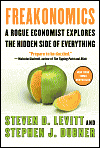Ye Olde Natural Philosophy Discussion Group
Reviews and comments on
Steven Levitt and Stephen Dubner:
Freakonomics: A Rogue Economist Explores
the Hidden Side of Everything [2005]

Our group had quite a lot of agreement about this book, but in spite
of that our ratings varied fairly widely, ranging from a couple highs of
7 down to a couple lows of 3, on a scale of 0 to 10. Our group average
was a middle of the road 5.1.
Everybody thought it was an easy and enjoyable read. Rich remarked that
it had an interesting variety of subjects and that it was a "kinda fun"
book. Kevin Schirado agreed with that but pointed out that it is well to
remember when reading a book that makes this much use of statistics that
"there are lies, damned lies, and statistics". He thought the book was
interesting, but not earth-shaking.
Barbara also found lots of things of interest in the book, especially in
the sections on the children's names and the material on the KKK. She was
a bit turned off by the chapter on drug gangs and crime, however.
Rosie said she liked the application of statistics to these varied
questions. She pointed out, though, that most of the reference sources
seemed to be to other publications by Levitt, and that the book didn't
really didn't seem to be all that important.
Kirby said he got turned off at the beginning. Although billed as a
book on weird economics, actually the book mostly involved statistics and
psychology and had very little actual economics in it. On the
whole Kirby was disappointed in the book, and said it seemed to be "sort
of fluff." Kirby said he heard an interview with Levitt on the radio
where he came off better.
Scott—unusual for him!—found lots to agree with in everyone else's
comments, both positive and negative. He too was expecting something more
in the way of an actual book on economics (but also felt somewhat
relieved that it wasn't such, given Levitt's bourgeois biases)! He pointed
out that Levitt has an unfortunate tendency to be unidimensional in
his explanations. For example, even if it is true that the availability
of abortions in earlier years was an important factor in the decline of
crime in the 1990s, this was still only one of many causes. Levitt
eventually admits this, but through his overemphasis on that one thing
tends to lead people into a simplistic understanding of what actually
happened.
John missed the discussion of this book because of the Opera. (Egads!)
But he sent around these comments:
|
My mini review of the book is that I liked it and rate it a
7. It was an easy read and I basically liked the questions asked
and the answers found. For some reason though I was initially
impressed that a lot of the questions being considered were sort
of trivial, but looking back at it I do think some are important
to consider, like why the crime rate dropped (legalized abortion)
and how (basically) drug gangs are organized. I didn't find it
surprising that they look a lot like your basic corporation in
America. The one thing I did find a bit annoying was how the
author(s) pumped themselves up at the beginning of each chapter.
That was just filling space as far as I was concerned.
|
|
Return to our complete list of books.
Return to our Science Group home page.
